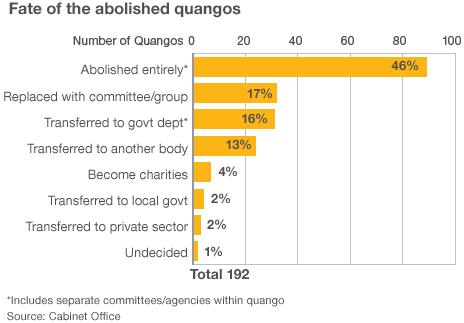Quango reduction plan botched, say MPs
- Published
Conservative MP Bernard Jenkin explains why the government's process for testing quangos had been too "vague" and "inconsistent"
Plans to axe scores of quangos will not save much money or improve accountability, MPs have warned.
A Commons committee found the whole process was "poorly managed" - its Conservative chairman Bernard Jenkin said it had been "botched".
The committee said pre-election claims about how much could be saved were "probably exaggerated".
But Cabinet Office minister Francis Maude told the BBC it would save "significantly more" than £1bn.
Shadow Cabinet Office minister Liam Byrne, for Labour, said: "The committee appears to confirm that Francis Maude is now Britain's most expensive butcher."
He said Labour also wanted to see fewer quangos and savings made but "now we know that the Tory-led government has handled this so badly that any savings have gone up in smoke".
'Hopelessly unclear'
In October the government announced it was scrapping 192 public bodies, external - such as the Film Council and the Audit Commission - while 118 would be merged.
Quangos - "quasi-autonomous non-governmental organisations" - are arms-length bodies funded by Whitehall departments but not run by them. They are advisory bodies, consumer watchdogs or organisations carrying out public services.
The government reviewed 901 bodies - 679 quangos and 222 other statutory bodies.
But in its report Shrinking the Quango State, external, the cross-party Commons public administration select committee said the tests used to judge the quangos were "hopelessly unclear".
"The current approach is not going to deliver significant cost savings or result in greater accountability," the report found.
"There was no meaningful consultation, the tests the review used were not clearly defined and the Cabinet Office failed to establish a proper procedure."
Its chairman, Mr Jenkin, said the whole process had been "rushed and poorly handled", adding: "This was a fantastic opportunity to help build the Big Society and save money at the same time, but it has been botched."
He told the BBC "very few" functions had been ended - which was the only way to reduce costs - most had been merged with other quangos or transferred to government departments: "The only reductions in cost are as a result of the general reductions in public spending and to that extent, the review is a disappointment."
The MPs said the potential for cost savings was "probably exaggerated" in pre-election promises. The Conservative manifesto said over the course of a Parliament, £1bn a year would be saved "from quango bureaucracy".
'Rigorous tests'
But Mr Maude told BBC Radio 4's Today programme there would be "very significant savings" - both from those which were being axed and from spending cuts in those which remained - but they were hard to quantify at this stage.

Asked about the £1bn figure he said: "It will certainly be at least that. The savings we will make from the whole landscape of quangos will be significantly more than that, very significantly more than that."
He said the review was not "primarily" being done to save money, it was mainly about increasing accountability, so ministers took responsibility for actions carried out by the state. The committee's report said not all its witnesses were convinced by this argument.
Professor Matthew Flinders of Sheffield University said ministers had told him that "in opposition it is much easier to throw bombs, but when you are in charge, you realise that a lot of these bodies do a lot of good work and you don't want them back in your departments".
Mr Maude said the government's review was the first time quangos had been subjected to "rigorous tests" which would continue - adding that previous governments had tended to "set up these bodies and then just forget about them".
He rejected the accusation the process had been "botched" and said it was "simply wrong" to suggest the process could end up costing more than it saved.
Mr Maude added: "Has it been a perfect process? No. Is it complete? Not by any means, this is the beginning of a process. Should we have waited around to have a less rush job? No. We had to get on with it and we're doing it."
The committee's report also said returning direct responsibility to ministers for some roles meant some issues could get lost in wider Whitehall remits: "This will mean less effective accountability and challenge on a day-to-day basis."
Len McCluskey, general secretary-designate of the Unite union, said: "Unite is urging the government to stop and rethink the reasoning behind the Public Bodies (Reform) Bill which has all the hallmarks of being hastily prepared and ill-thought-out."
Read a selection of your comments
- Published14 October 2010
- Published14 October 2010
- Published14 October 2010